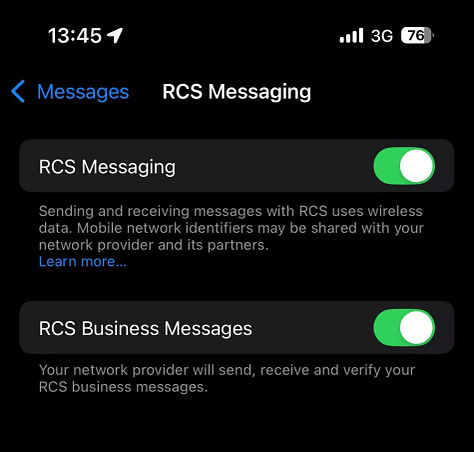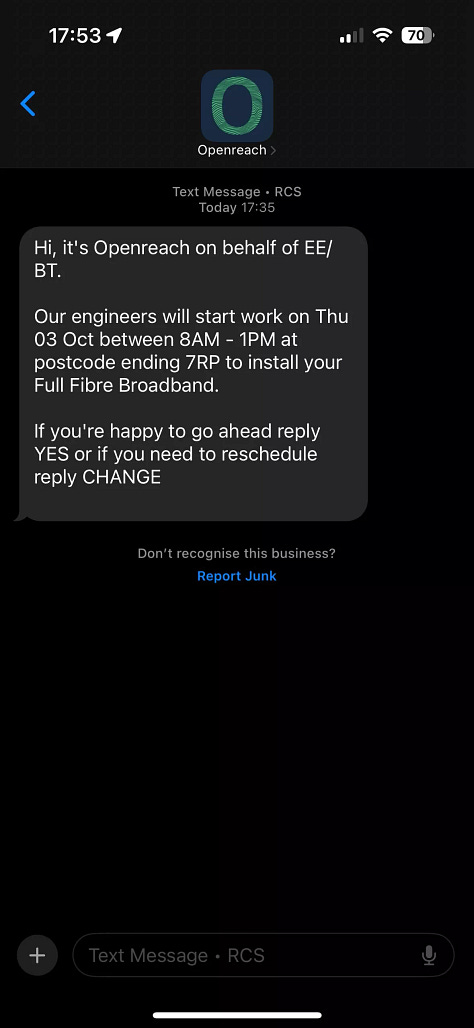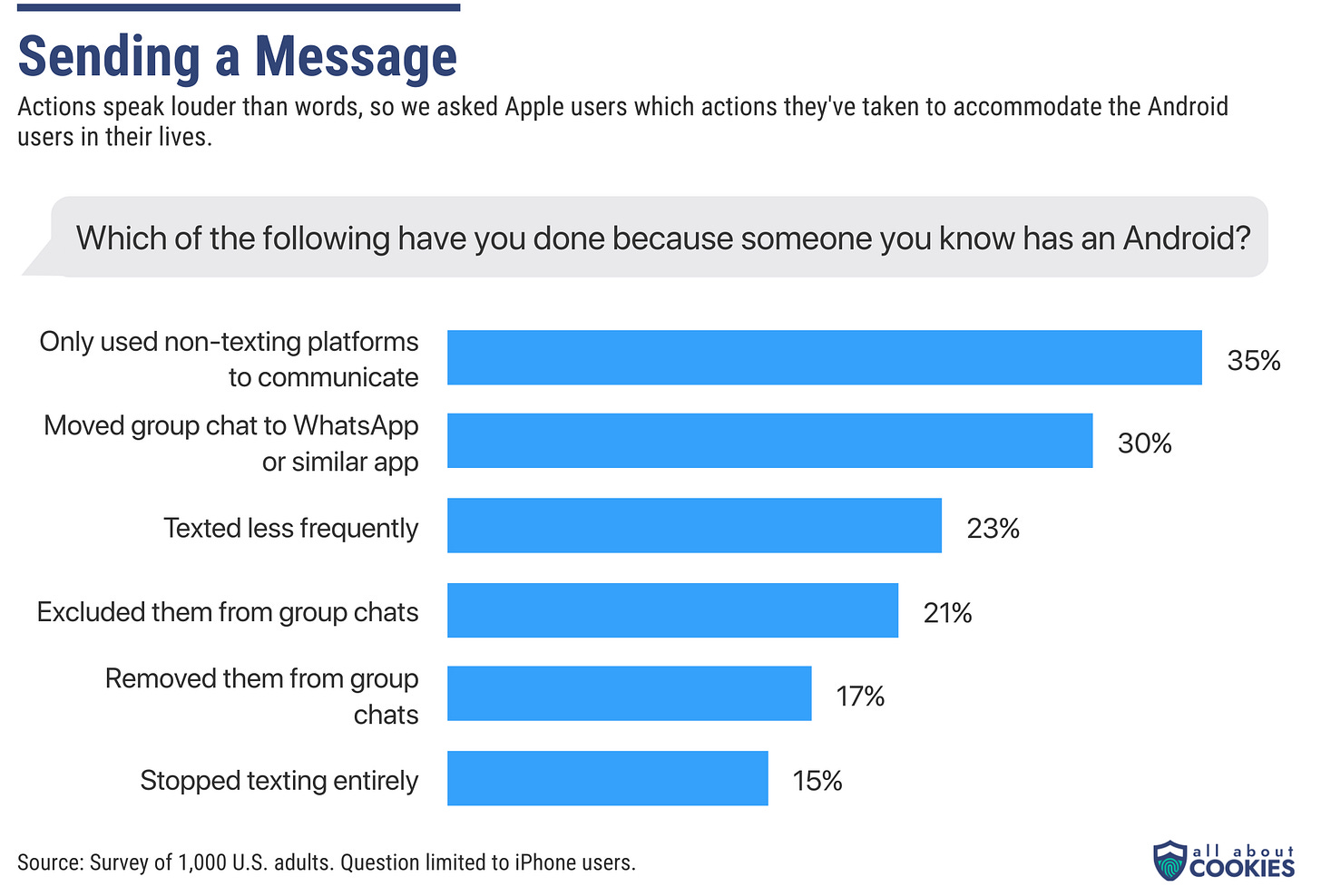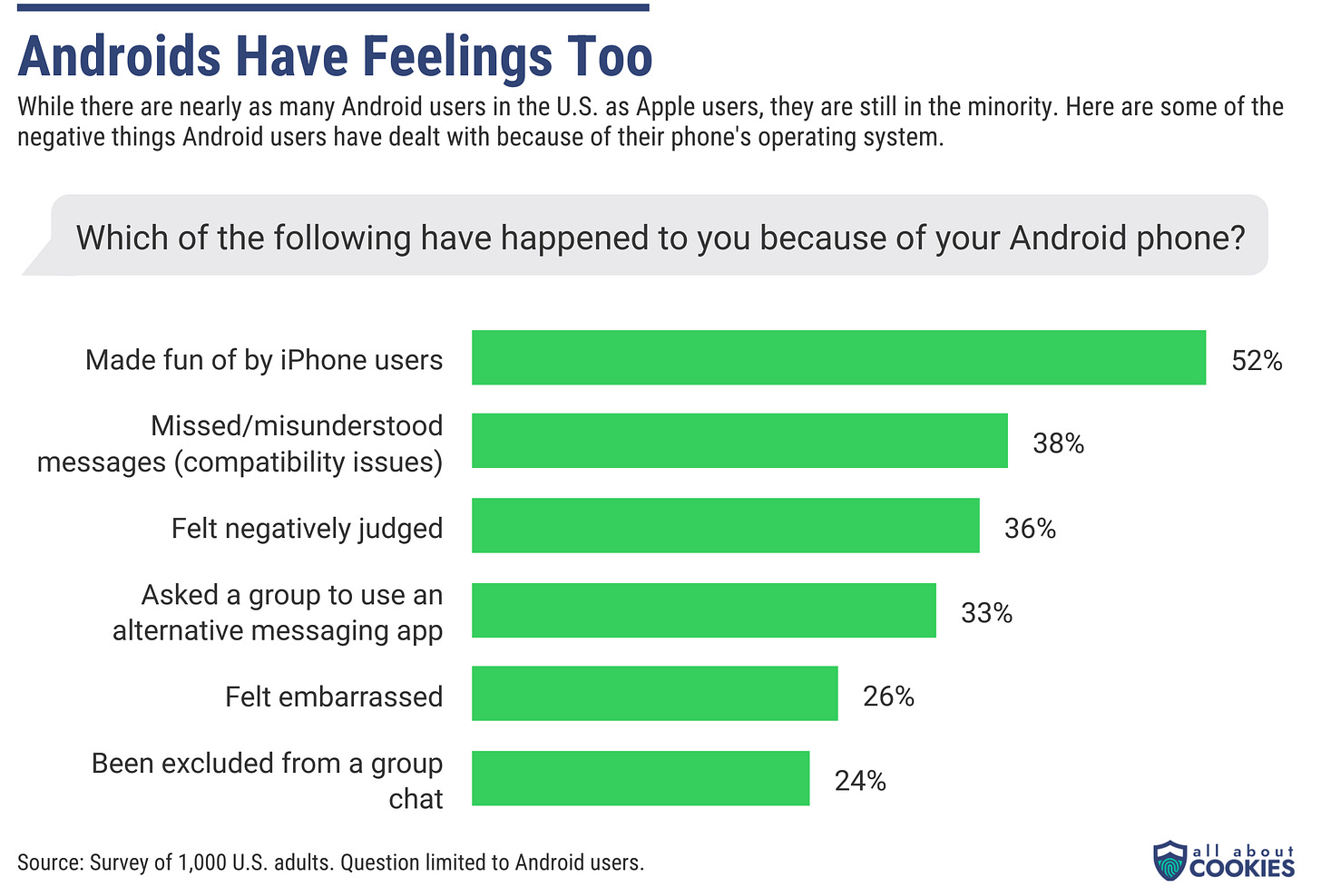Two months of RCS on the iPhone
A look at how this mistake of a technology is going with iPhone users that have recently joined in using this “modern industry standard” (LOL)
RCS, for which I don't exactly hide my disdain, launched on iPhones on September 16th with iOS 18. While Apple’s change of heart on it has been attributed by some to the Digital Markets Act (DMA) and iMessage interoperability requirements, RCS is — maybe with the exception of RCS Chats by Google (but that’s another conversation) — a (phone) number-based interpersonal communication service under EU law while iMessage is number-independent and the two systems are completely separate anyway so RCS does not make iMessage interoperable.1 But the real reason for RCS adoption seems to be a Chinese law and Apple has apparently decided to make it available across the globe (even though RCS was only recently enabled in China with iOS 18.1), perhaps also to placate US anti-trust enforcers, including the Department of Justice (which took a stab at messaging competition, or lack thereof, on iPhones) or to avoid making their anti-competitive practices even more blatantly obvious with the exclusion of RCS from other jurisdictions.
There’s no shortage of things to dislike about RCS2. From a usability perspective, it’s tied to your phone (and is generally OS-dependent), phone number and carrier with all the complexities in the set up process — including that it potentially requires support from every carrier in the world to be ubiquitous — and privacy issues that come with that. It has virtually no metadata protection and like almost all technology emanating from the telecommunications sector, it’s also a security nightmare3. Maybe that’s why China or Chinese carriers like it so much. End-to-end encryption (E2EE) is nice — though good luck ever changing how it works — but it still has issues and I certainly wouldn’t be putting any eggs in this basket. You’re far better off going with Signal, SimpleX, iMessage, Facebook Messenger or WhatsApp. And frankly the less you know about how RCS works (and what is required to get it working) on a technical level, the better.
With the launch of RCS on iPhone, users noted issues like iPhone-generated stickers disappearing from Android phones after a few seconds and just generally conversations appearing differently and being inconsistent. For some users messages would fail to send or it would take 15-30 minutes to deliver RCS messages — but hey, it’s better than messages being delivered late in the midst of a natural disaster or SMS messages arriving 9 months late — but this is the kind of jankiness you get when telcos are involved in a complex ecosystem, though at least some of these issues are almost certainly Apple’s fault.
Apple (or at least it appears that the issue was on their end) did however recently (in the iOS 18.1 update) fix an issue where RCS reactions weren't showing correctly in the Messages app but it should come as no surprise that RCS on iPhone is a little half-baked. It also does not support message editing, rescinding messages or direct replies4, though in fairness to Apple that was (embarrassingly) only recently added to Universal profile in v2.75 so some hiccups are to be expected (but iMessage of course doesn't suffer from the same issues). As long as you’re not breaking Chinese law, why let any good bug go to waste in making the UX more frustrating? iOS 18.1 does however also add support for RCS Business Messaging (RBM):



What is not supported at all is E2EE, though Apple might be right to wait on the GSMA to come up with a standard — perhaps incorporating Messaging Layer Security — instead of letting Google run the whole show (and even they only recently implemented E2EE encryption for group chats). Nonetheless, it not being built into the standard as mandatory gives an opening for governments (including China) to demand from their carriers to turn it off whereas it would be much harder to demand the same from WhatsApp, Signal, iMessage — the only E2EE messaging service allowed to operate in China — and other global services not under their direct control. Even worse, with its promise of universal connectivity, users may abandon other more private and secure (centralized) messaging services.
Lastly, even if all participants in a conversation are on phones that support RCS, SMS could still be used as a fallback in cases where there’s no internet connection. That may not sound important but it does break group conversations and will continue to be an annoyance. My understanding is that post-iOS 176 this is no longer true for (what I call) multi-protocol group7 chats which operate over both the iMessage and SMS/MMS protocols, which means that, at least for iOS users, group chats don’t break when someone switches from iMessage to SMS/MMS. iMessage users can therefore still make use of features like message editing8, direct replies and high-resolution photos and videos although that of course isn’t reflected on the side of SMS/MMS users. I could be wrong and I haven’t done in-depth research on this but the same benefits to iPhone users do not seem to apply to iMessage group chats where a participant changes to RCS.9 At the very least you can’t add RCS users to an existing iMessage group chat.
False promise of interoperability and openness
This whole mess is a result of Google’s inability to produce a good and lasting instant messaging product for a decade and a half, largely owing to its inability to create a product and stick to it. They were very close to success with Hangouts but, despite nearly everyone having a Google account and a lot of the world using Gmail, they fumbled it completely and shut it down in November 2022. RCS is Google’s latest solution which they seem to have landed on in the quest to get OEMs on board with the Google Messages app being the default everywhere and carriers on board with displacing SMS — both perhaps also to avoid scrutiny from competition regulators.
But make no mistake, in practice, RCS is just a Google product with extra steps. Or at least it was until recently. For Google, Apple supporting RCS could even turn out to be a trojan horse since now the standard is no longer defined by them but by the lowest common denominator that Apple chooses, or it at least makes the whole messaging system even more complex and unpredictable for the users. Google can update its Messages app on the fly, but RCS updates on iOS require full-blown software updates so that Universal Profile (or rather its latest version) might not be so universal in the long run. But to be fair, iMessage suffers somewhat from this as well.
The Google Messages app dominating — and taking care of all the complexity for everyone in a consistent experience — has resulted in Samsung deprecating its own messaging app (probably because they didn’t want to deal with whole mess) and Verizon’s Messages+ app also very recently shutting down. But, as demonstrated, even with two predominant clients (Google Messages and Messages app on iOS), the RCS UX is not exactly smooth sailing.
In Western countries RCS is therefore really a interoperable standard between the iOS Messages app and Google's Messages app on Android. It doesn't provide meaningful interoperability in basically any sense other than the infrastructure maybe being hosted by one’s carrier — or whoever they outsource that to, which is often just Google’s Jibe platform anyway — instead of Google. That is frankly worse than Google controlling it all.
Was it really worth adding so much complexity to the messaging stack — thus increasing its attack surface in the part of the OS that’s one of the primary vectors for spyware — for such a lackluster standard? Real iMessage interoperability (or mandating an actually good living standard) would have been the solution to end all other “solutions” but we’re not getting that from regulators in the US or the EU.
Impact on competition
While I hate RCS on a technical and design level, an intra-duopoly bridge is still helpful, competition-wise, at least in the US. Who knows... maybe that is, at least in part, the reason for the recent success of Pixel phones in the US, especially because Google happily advertises it in its store and promo videos:
What they don't advertise is the irony of them still not supporting RCS on Google Voice (despite acknowledging the absurdity more than two years ago) and Google Fi. Well the latter does support RCS but only on Android… if you disable message sync. But what Google Fi and Mint Mobile, another US MVNO, don’t support is RCS on iOS, although that appears to be more Apple’s fault for not updating the carrier bundles. And this is just the US market. iPhones don't benefit from auto-onboarding where RCS is not supported by the carrier itself, unlike what Google has in its Messages app where it then provides the RCS service in place of the carrier. Apple having to enable RCS per-carrier does not bode well for its international rollout and support. Merely 16 carriers in the Europe region support RCS on iPhone!
It’s unclear if, and to what extent, RCS adoption in the US will change the stigma around green bubbles (which RCS also uses) or help Android regain some of that US market share among young people. But it’s worth looking at what the starting point is:
Last month, All About Cookies ran its own US research, finding that “more than 1 in 5 iPhone users (22%) say they think less of someone when they see a green bubble pop up in a text conversation and nearly 1 in 4 (23%) say it’s a dating dealbreaker. As a result, about a third (30%) of Android users have considered switching to an iPhone because of the sheer pressure and mockery.”
And with the current RCS deployment on iPhones not killing those green bubbles, not much has changed. Typing indicators and clearer images are good, however it seems that security and blue-bubble-cachet is better. But, says All About Cookies, “the good news? More than 2 in 5 iPhone owners (42%) have relied on third-party messaging apps (like WhatsApp) to accommodate non-iOS users.” Good for those users—but not so good for Google and millions of its Messages users.
Men also seem to be twice as judgmental about green bubbles as women:
Interestingly, this distinction appears to matter more to men, as just 15% of female respondents said they look down on Android users while nearly double that percentage of males (29%) said the same."
Sometimes the responses by iPhone users can be quite drastic, like excluding or removing people from group chats or stopping texting with them entirely.
And it’s pretty clear Android users would rather not put up with the abuse.
Apparently that’s enough for 30% to consider switching to iPhone. I don’t think there’s any denying that iMessage’s allure is real. Especially when only 42% Apple users say that they’ve ever switched to a third-party messaging app to accommodate non-iOS users.
But polling by Android Authority (while probably not the most methodologically rigorous or representative) also indicates iPhone users just aren’t that into RCS, even though it is enabled by default.
If you’re as tired hearing about this green-blue bubble duality and its discontents as I am, then I’m afraid all we’re not done hearing about all the various RCS shenanigans. At the very least RCS adoption in the US has the potential to move the needle on iOS-Android competition. Frankly that’s more than we can say for other interoperability solutions, like those offered by WhatsApp and Facebook Messenger as a result of the DMA. I just hope no politician decides to replicate the RCS mandate in the EU.
I of course leave open the possibility that Apple offered RCS adoption as a reason for the European Commission to not designate iMessage as a core platform service under the DMA, the argument being that an interoperable protocol would already be available (presumably by default) on iPhones. But this is not mentioned in any decisions so if such an offer was made it might have been unofficial and not in the DMA legal filings. Nonetheless, some noted that the announcement was made the day before the Commission was supposed to publish its conclusions into the iMessage market investigation (that ultimately resulted in it not being designated) and Apple apparently did threaten to withdraw iMessage from the EU if it was designated.
Or maybe we should use one of its numerous other names: “Advanced Messaging and 5G Messaging (in China), and was previously variously marketed as chat features, enhanced chat, joyn, SMSoIP, and SMS+”
Apple’s support article also says your IP address may be shared with other RCS users (despite this not being a peer-to-peer communication system). I’m not sure what that’s about and I would rather not look into it. Maybe something to do with companies that run their own RCS business messaging?
The Washington Post notes that scheduled send is also not supported while it is on iMessage and Google’s Messages app however the former implements it server-side and RCS (at least to my knowledge) doesn’t have the requisite server-side logic to enable that, leaving client-side the only option (with the catch that the scheduled message won’t send if you’re offline at that time).
I’ve seen the claim that Chinese law requires Apple to only support Universal Profile v2.4 floating around but I haven’t been able to tie that directly to any legal requirements. Apple’s RCS implementation has so far been based mostly on v2.4.
Before iOS 17, as soon as one iMessage group chat participant switched to SMS/MMS, the entire group chat would be downgraded to SMS/MMS. My understanding is also that even other iMessage users would receive those cumbersome reaction messages (for example Alice liked <message>).
Since the introduction of iMessage you could of course always have multi-protocol chats but only with one person where their SMS/MMS and iMessages would be stitched together into one conversation. SMS/MMS group chats are legitimately more difficult because they are not tied to a group chat ID but rather are addressed with all the participants in the chat (which is also what makes removing participants from the chat impossible, forcing you to start a new chat).
https://support.apple.com/guide/iphone/unsend-and-edit-messages-iphe67195653/ios explains that “SMS, MMS, or RCS text messages can be edited in a group conversation as long as there’s at least one other iMessage user in the group”.
I also don’t know how RCS and SMS (and maybe even iMessage as the third protocol) interact in similar group chats scenarios.





